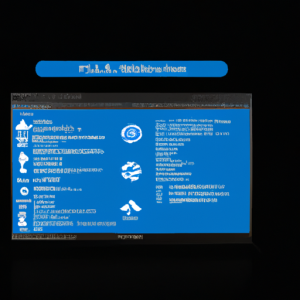Microsoft Azure: Now with AI Power
Artificial Intelligence (AI) has revolutionized the way businesses operate, and Microsoft Azure is at the forefront of this transformation. With the integration of AI capabilities, Azure has become an even more powerful and efficient platform for businesses to build, deploy, and manage applications. In this article, we will explore the AI revolution, how OpenAI pitched Microsoft, the efficiency of Azure AI, and how it can be used in various industries such as consulting and banking. We will also discuss the various Azure services, including virtual machines, Azure Virtual Desktop, hybrid AD, Azure SQL, and Azure Sentinel.
The AI Revolution and OpenAI’s Partnership with Microsoft
The AI revolution has brought about significant advancements in technology, enabling machines to learn, reason, and understand human language. OpenAI, a leading AI research organization, has been at the forefront of this revolution. In 2020, OpenAI partnered with Microsoft to develop and deploy AI models on Azure, Microsoft’s cloud computing platform. This partnership aimed to accelerate the development of AI technologies and make them accessible to a broader audience.
Microsoft’s investment in OpenAI has allowed the company to enter the GPU space, which is crucial for AI development. GPUs (Graphics Processing Units) are essential for training large-scale AI models, as they can process massive amounts of data quickly and efficiently. By integrating GPUs into Azure, Microsoft has made it easier for businesses to access and utilize AI technologies.
Azure AI: Automatic, High-Performance, and Efficient
Azure AI is a suite of AI services that enables businesses to build intelligent applications with ease. These services include machine learning, cognitive services, and knowledge mining. Azure AI is designed to be automatic, high-performance, and efficient, making it an ideal choice for businesses looking to leverage AI technologies.
One of the most notable AI-powered tools in Azure is GitHub Copilot, an AI-powered code completion tool that helps developers write code faster and more efficiently. Copilot uses machine learning algorithms to understand the context of the code and suggest relevant code snippets, making it easier for developers to write high-quality code.
Azure OpenAI Service: Large-Scale AI Training
The Azure OpenAI Service is a cloud-based platform that enables businesses to train large-scale AI models efficiently. This service provides access to powerful GPU clusters, allowing businesses to train AI models faster and at a lower cost. With the Azure OpenAI Service, businesses can easily scale their AI training infrastructure to meet their needs, making it an ideal solution for organizations looking to leverage AI technologies.
Example: Using Azure AI in Consulting and Banking
Azure AI can be used in various industries, including consulting and banking. For example, a consulting firm can use Azure AI to analyze large datasets and identify trends and patterns that can help their clients make informed decisions. Similarly, a bank can use Azure AI to detect fraudulent transactions, assess credit risk, and provide personalized financial advice to customers.
By leveraging Azure AI, businesses in these industries can improve their decision-making processes, streamline operations, and enhance customer experiences. This demonstrates the power and versatility of Azure AI and its potential to transform various industries.

Azure Virtual Machines and Azure Virtual Desktop
Azure Virtual Machines (VMs) are a core component of the Azure platform, allowing businesses to create and manage virtual machines in the cloud. VMs can be used for various purposes, including running applications, hosting websites, and storing data. Azure VMs offer a range of features, such as automatic scaling, high availability, and disaster recovery, making them an ideal choice for businesses looking to deploy applications in the cloud.
Azure Virtual Desktop is a virtual desktop infrastructure (VDI) solution that enables businesses to deliver virtual desktops and applications to their employees. This service provides a secure and scalable environment for businesses to manage their virtual desktops, allowing employees to access their work resources from any device, anywhere. With Azure Virtual Desktop, businesses can reduce IT costs, improve security, and enhance employee productivity.
Hybrid AD and Azure SQL
Hybrid AD (Active Directory) is a feature of Azure that enables businesses to extend their on-premises Active Directory to the cloud. This allows businesses to manage their users, devices, and resources in a unified manner, regardless of whether they are located on-premises or in the cloud. Hybrid AD provides a seamless and secure experience for businesses looking to transition to the cloud while maintaining their existing IT infrastructure.
Azure SQL is a fully managed relational database service that provides businesses with a scalable and secure platform for storing and managing their data. Azure SQL offers a range of features, such as automatic backups, high availability, and performance tuning, making it an ideal choice for businesses looking to migrate their databases to the cloud. With Azure SQL, businesses can reduce their IT costs, improve performance, and enhance data security.
Azure Sentinel: AI-Powered Security
Azure Sentinel is a cloud-native security information and event management (SIEM) solution that uses AI and machine learning to detect, investigate, and respond to security threats. Azure Sentinel collects data from various sources, such as devices, applications, and users, and uses AI algorithms to identify potential security threats. This enables businesses to quickly detect and respond to security incidents, reducing the risk of data breaches and other cyberattacks.
By leveraging Azure Sentinel, businesses can improve their security posture, streamline their security operations, and reduce the complexity of managing their security infrastructure. This demonstrates the power of AI in enhancing security and protecting businesses from cyber threats.
Conclusion
Microsoft Azure, now with AI power, has become an even more powerful and efficient platform for businesses to build, deploy, and manage applications. The integration of AI capabilities, such as Azure AI, Azure OpenAI Service, and Azure Sentinel, has transformed the way businesses operate and enabled them to leverage AI technologies to improve their decision-making processes, streamline operations, and enhance customer experiences. With services like Azure Virtual Machines, Azure Virtual Desktop, hybrid AD




